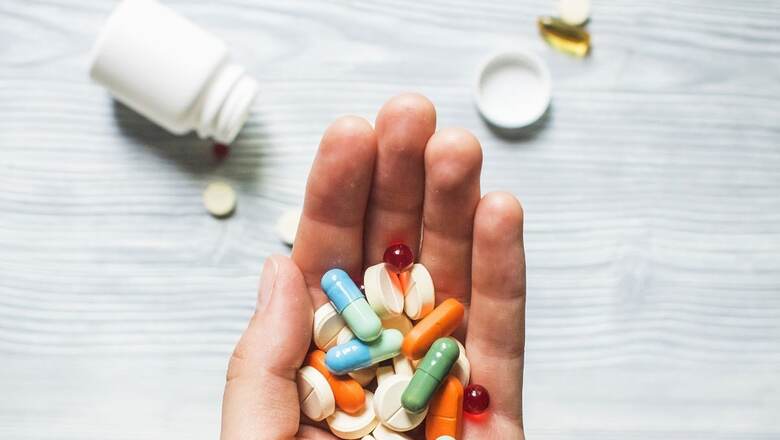
views
The Modi government, in an effort to reduce Chinese imports, has formed a high-level panel to boost domestic production of bulk drugs used for manufacturing medicines in India.
According to the parliamentary standing committee report on chemicals and fertilizers, a high-level committee has been constituted under Union minister Dr Mansukh Mandaviya to oversee the implementation of the scheme called promotion of “bulk drug parks”.
Despite being the top supplier of medicines across the globe, the Indian pharmaceutical industry is highly dependent on China for raw materials, even to produce a basic medicine like Crocin.
Indian drug-makers import more than 80 per cent of their total Active Pharmaceutical Ingredient (APIs) or bulk drug requirements from China.
In fact, in the 2018-19 fiscal, the Union government told Lok Sabha that the pharmaceutical industry imported bulk drugs and intermediates worth $2.4 billion from China.
The panel, headed by Lok Sabha member Dr Shashi Tharoor, said “it is pertinent to note that the country is in urgent need of meeting the requirement of bulk drugs indigenously rather than through imports”.
It was apprised that “regular review meetings are being held at the level of the secretary”. Also, project management agencies are pursuing with the states for implementation of the scheme as per the scheme guidelines.
“The Committee is appreciative of the measures taken by the Government for effective implementation of the ‘Promotion of Bulk Drug Parks’ scheme and hope that an amount of Rs.900.00 crore allocated under the scheme for FY 2023-24 would be fully utilized,” the report said.
As per the report, “the committee draw some satisfaction from the fact that the State Implementing agencies (SIA) have indicated completion of these projects within next 24-28 months which will be around the year 2024-2025 being the last year of the scheme period”.
The Department of Pharmaceuticals under the Union Ministry of Chemicals and Fertilizers is responsible for formulating and executing policies for drug manufacturing and making in India. All queries and recommendations of the panel were replied to and noted by DoP.
Panel happy with the execution of Jan Aushadhi Yojana
A financial outlay of Rs 490 crore was approved by the government for Pradhan Mantri Bhartiya Janaushadhi Pariyojana (PMBJP) – PM Modi’s flagship scheme to promote the use of affordable generic medicines – for the period 2020-2021 to 2024-2025.
The committee said it is “happy to note that the DoP has been able to optimally utilise the funds allocated for the PMBJP during the last three years”.
Besides, physical targets fixed during these years to open new ‘aushadhi kendras’ and enhance the product basket of medicines and surgical and establishing wares have been largely achieved except in respect of warehouses.
“The Committee appreciate the efforts of the Government in making quality generic medicines available to all at affordable prices.”
Several hyped schemes under-utilising budgets
Several ambitious programmes, including efforts to enhance research and innovation in drug development, have struggled to secure funding despite ample allocations.
The parliamentary panel has underscored the substantial underutilisation of allocated funds. It has suggested that the government should allocate additional funds for new initiatives which include the Promotion of Research and Innovation in Pharma-MedTech Sector (PRIP), the establishment of the National Institute of Medical Devices Education and Research (NIMERs) and the National Institute of Pharmaceutical Education and Research (NIPER).
PRIP is the scheme Finance Minister Nirmala Sitharaman announced as the new programme in the budget session to promote research and innovation in pharmaceuticals.
While the pharma department replied that it has “duly noted” the committee’s concerns, it added that the department has obtained approval for the PRIP scheme during the expenditure finance committee (EFC) meeting held with an overall budget of Rs 5,000 crore for a duration of five years, from 2023-24 to 2027-28.
“The scheme would be placed for approval of the cabinet after recommendations of the Empowered Technology Group (ETG).”
However, the reply is “silent” on the fund allocation for new schemes such as ICPMR and for the establishment of NIPER in southern states where interest in pharmaceutical education is high.
Proposed allocations are being cut, pharma dept still satisfied
The panel noted that for the financial year 2023-24, the DoP projected a budget allocation of around Rs 5,728 crore for its various schemes. However, the Ministry of Finance reduced the same and has allocated Rs 3,160 crore.
Similarly, during 2022-23, the proposed allocation of Rs 10,383 crore was reduced to Rs 2,244 crore. “The DoP, however, is largely satisfied with an overall increase of 40.84 per cent in gross budget allocations in 2023-24 as compared to 2022-23 except that in two of its schemes where the proposed allocation has been drastically reduced.”
The National Institute of Pharmaceutical Education & Research (NIPER) and the Production Linked Incentive Scheme for Pharmaceuticals (PLI) are those two schemes.
News18 reached out to top officials in DoP to seek a response over the under-utilisation of funds. However, these officials refused to comment, adding that formal comments have already been shared with the parliamentary panel and embedded in the report. “There is nothing more we can add now,” said a top officer at DoP, requesting anonymity.



















Comments
0 comment